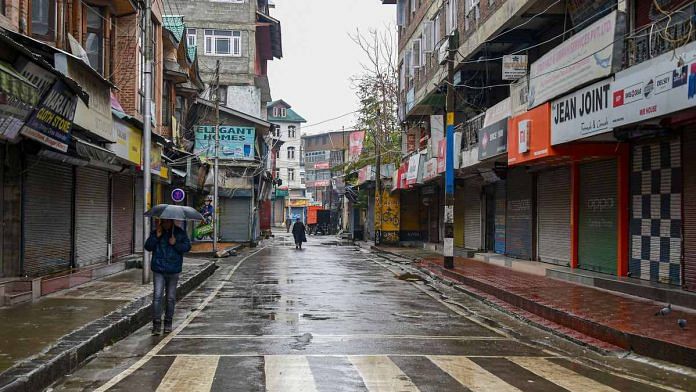New Delhi: The Supreme Court Monday directed that a special committee led by the Ministry of Home Affairs secretary should be constituted to look into whether 4G internet services should be restored in the Union Territory of Jammu and Kashmir.
The committee will also include the Department of Communications Secretary of the Union Ministry of Communications and the Chief Secretary of the Union Territory of Jammu and Kashmir.
This committee has been asked to look into the petitioners’ contention, as well as examine the alternatives suggested by them, on allowing faster internet on a trial basis in areas wherever possible.
Dictating the order, Justice N.V. Ramana said, “This court has to ensure national security and human rights are balanced. We do recognise that the UT has plunged into a crisis. At the same time the court is cognizant to the concerns related to ongoing pandemic and hardships.”
The bench, also comprising Justices R. Subhash Reddy and B.R. Gavai then referred to the judgment in the Anuradha Bhasin case, popularly known as the Kashmir internet shutdown case.
In the case, the same bench declared that the freedom of speech and expression and the freedom to practice any profession or carry on any trade, business or occupation over the medium of Internet enjoys constitutional protection under Article 19(1)(a) and Article 19(1)(g), respectively. Article 19 of the constitution guarantees the freedom of speech.
Noting that the Anuradha Bhasin case had also advocated for adequate procedural safeguards while implementing internet shutdowns, the apex court Monday directed constitution of a special committee to examine the petitioners’ contentions.
The court judgment said, “While it might be desirable and convenient to have better internet in the present circumstances, wherein there is a worldwide pandemic and a national lockdown. However, the fact that outside forces are trying to infiltrate the borders and destabilize the integrity of the nation, as well as cause incidents resulting in the death of innocent citizens and security forces every day cannot be ignored.”
It also accepted the government’s contention that the limitation on internet speed was to “restrict the flow of information in order to prevent misuse of data by terrorists and their supporters to disturb the peace and tranquility of the Union territory of Jammu and Kashmir.”
The central government had imposed a complete internet shutdown in the erstwhile state of Jammu and Kashmir in August 2019, after scrapping Article 370 which gave J&K its special status. Eight months later, it restored internet services partially, to allow 2G speed for mobile users on 4 March.
After this, several orders were passed from time to time, retaining speed restrictions. The last order was passed on 27 April, allowing these restrictions till 11 May.
Also read: How Pakistan ‘deep state’ is using coronavirus cover to fuel terrorism in Kashmir
What the petitioners said
On Monday, the Supreme Court was hearing petitions filed by Foundation of Media Professionals, Private Schools Association of J&K and lawyer Soayib Qureshi, challenging the functioning of 2G services in the region.
In their petition, they had contended that the speed restriction on the internet amid the nationwide lockdown and Covid-19 pandemic violated the fundamental rights of the citizens. They filed testimonies from doctors, students and other professionals who were facing difficulties because of the internet speed.
During the previous hearings, the court heard arguments by the Jammu and Kashmir government, which focussed on the need for slow internet speed to curb instances of terrorism and violence in the region.
The administration also submitted that the right to internet access is not a fundamental right and the state can curtail the freedom of speech and right to trade through the internet. It called the internet speech curbs reasonable and asserted that these were necessary to protect the sovereignty, integrity and security of the country.
However, senior advocate Huzefa Ahmadi, appearing for Foundation of Media Professionals, highlighted the need for maintaining the fundamental right to access of healthcare in times of a pandemic.
He also highlighted the impact of slow internet on education, contending that students cannot attend classes through video conferencing because of the slow speed of the internet.
Ahmadi further claimed that the reduction in internet speed violated the Anuradha Bhasin judgment, as none of the orders imposing internet speed restriction was placed before a review committee and that none of the review committee reports were made public.
After hearing these arguments, the court had reserved judgment in the case on 4 May.
Also read: Riyaz Naikoo killing doesn’t avenge Handwara. India must stop glorifying soldiers’ deaths




It will be wonderful to have special committees for deciding on all potential citizens misgivings against the state. We can dramatically reduce the case backlog in courts . It’s beautiful!
Ethnic cleansing of HINDUS was carried out in Kashmir valley with full support of majority without 4g.